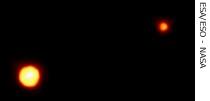2006年VOA标准英语-Pluto Demoted, No Longer a Planet(在线收听)
By David McAlary
Washington
24 August 2006
Pluto is no longer a planet. The world's top group of astronomers, the International Astronomical Union, has stripped Pluto of the status it has held since its discovery 76 years ago. The body decided that, when it comes to planets, size matters.
-----
The International Astronomical Union's general assembly, meeting in Prague, has voted to accept only eight planets in our solar system. A U.S. astronomer who was there, Richard Binzel of the Massachusetts Institute of Technology, says the astronomical community has decided Pluto is not a planet, but something else.
"The community has decided that Pluto is best described as a 'dwarf' planet," said Binzel.
This is a big decline in Pluto's fortunes since the astronomers began their meeting on August 14. At that time, they faced a resolution hammered out by Binzel and several others not only keeping Pluto as a planet, but adding three more - Pluto's largest moon, Charon; the asteroid Ceres; and a larger, more distant body discovered last year, provisionally named Xena.
 Pluto, left, and Charon seen through NASA's Hubble Space Telescope |
||
But Binzel says most astronomers at the assembly favored a more exclusive definition that considers more than just a body's shape.
"It's simply a matter of what criterion is the most important?" explained Binzel. "Is the shape of the object the most important criterion, or is it how it orbits? Ultimately, of the members present who calculate things like orbits, that was deemed to be a more important consideration. So it was just a change of emphasis."
The newly-accepted definition says a planet must be not only spherical, but also must have cleared away all other objects in its vicinity. Its gravitational force must either have either pulled them in and absorbed them or flung them away. The icy, distant bodies Pluto, Charon, and Xena orbit among thousands of other similar bodies in a region of the solar system beyond Neptune called the Kuiper Belt. Furthermore, Pluto's orbit overlaps Neptune's. Ceres circles among a large number of astreroids. In each case, these dwarfs are too small to exert enough gravity to give them more space.
Pressure has been building to demote Pluto since the Kuiper Belt was discovered in 1992, but California Institute of Technology astronomer Michael Brown says his discovery of Xena last year forced the issue.
"I may go down in history as the guy who killed Pluto," said Brown. "It's not necessarily what I set out to do when I came to work that morning, but sometimes these things just happen."
Of course, millions of textbooks must be revised and schoolchildren the world over taught that our sun now has only eight planets.
High school science teacher John Whitsett of Fond du Lac, Wisconsin, the president-elect of the U.S. National Science Teachers Association, says the change is positive because it shows students that science is not merely a collection of static facts.
"Teachers can then really demonstrate that science is a problem solving process, and that we're constantly having to modify our body of knowledge based upon the information we come up with later," noted Whitsett.